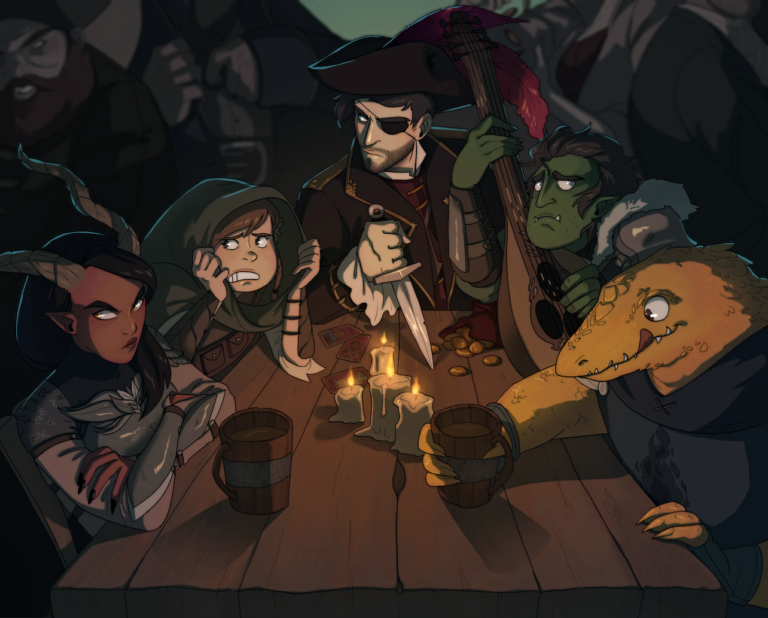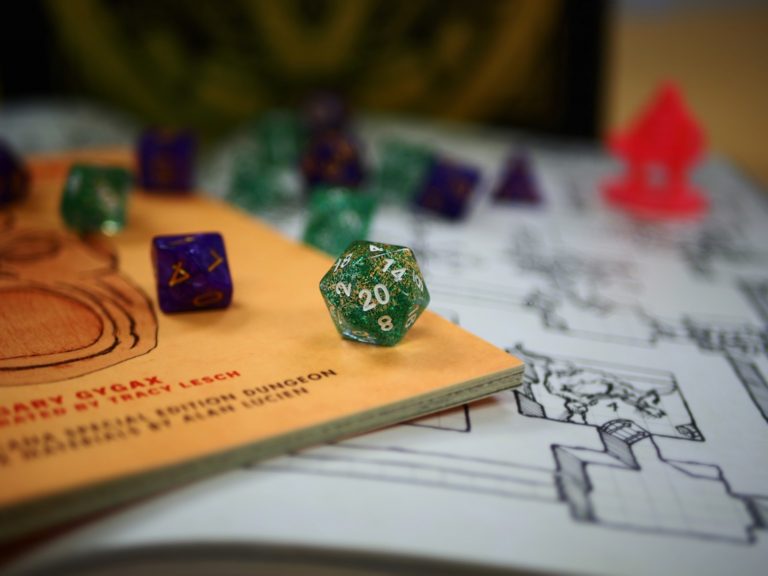For the longest time in tabletop games, I made sure to give my characters high Intelligence and Wisdom scores. I suppose I figured I could handle being clumsy or a bad fighter or uncharismatic better than I could handle being unobservant. But in my most recent campaign (5e, Forgotten Realms, for the curious) I bit the bullet. I did the thing. I decided to play The Dumb One.
To be fair, memes I’d seen in the past were focused on how to “cope” with rolling up low INT or WIS scores: how to “punish” the DM for not letting you buff them up at the beginning by overplaying your character’s foolishness to a game-breaking degree. But watching other people address their characters with full enjoyment (see Egbert the Careless) got me to give it a go. And if you haven’t given it a go, you should. I promise, the whiffed Perception and Insight checks are worth it.
It Builds Confidence
I’m not new to tabletop gaming (I’m not an old hand, but I’ve been in a few games before)… but in this particular game, I knew literally no one except for the DM. I was coming in when everyone else had worked their way up to Level 6 in-game, working my way into a party that had already had adventures together and built up friendships, and I felt super awkward. I knew that awkwardness would probably come through as I attempted to become a part of the group.
Having a character who just, by nature of her personality, didn’t catch on to things gave me room to ride out those first few sessions. Getting the hang of a new character, a new game, and a new social circle is a lot, but I could work any of my anxiety-driven absentmindedness into my new bard. Whether that’s your story, or you’re new to gaming in general, it definitely gives you wiggle room to find your way.
It Will Break You of Metagaming
As a writer, I love “big picture” thinking. In another game I’m playing (in which I play a Halfling Cleric who may be pulling a Martin Luther pretty soon), I have to compartmentalize what she knows and understands, and what I know and understand. Even with fairly standard stats, I have to decide on the fly what she personally would glean from visions and records and intel, based on where I feel her story arc may be going.
Not so for Typhoon Macroburst, Air Genasi Bard. She lives in the here and now, with her main focus being going to cool parties and escaping her surprise arranged marriage. Do I have some idea of where her story may be going? Of course: I know our DM, and we have shared influences when it comes to entertainment. But I never once have to question whether Ty would have those same ideas. She absolutely wouldn’t—which forces me to play more in the moment and find the fun already in front of us.
Crits Are Cooler, Crit Botches Hurt Less
When your character is already inclined to trip over their own feet or not see what’s right in front of their nose, that dreaded 1 feels a lot less dire (when it’s not a Saving Throw, at least). Ty can take a crit botch in stride… and even play it off in character, because there will definitely be something else attracting her attention at any given moment.
On the other hand, that Nat 20 is mind-blowing, because it’s neither necessary nor expected. Come to that, high rolls in general are just a bonus treat, because it’s like she’s had a magic moment of clarity. It may never come again, but for one second, she was putting in maximum effort. Dice rolls are always going to be stressful, but the encouragement to play off a bad roll rather than dread it is always good.
New Opportunities for Character Building
Sometimes characters are just doofy. (See, again, Egbert the Careless.) But what does that mean for them? Is there a psychological reason? A medical reason? Is there literally no reason? Is it something they embrace, or something they wish they didn’t have to deal with? What does this mean for family and friend interactions?
A good gaming party embraces each other’s differences and has fun with them, which can (and likely will) be very different to whatever happened in their back story. In the case of Ty, it’s a major part of why she’s out in the wide, weird world in the first place. The party understands and cares about her, in sharp contrast to her family. But just how much that means to her (and what it has to do with the current events of the story) isn’t out there to the other players yet… and it’s going to be very interesting when it is. Similarly, there are compelling (or funny, or sweet, or sad) ways this stat can work into your character’s story.
It Makes Your Fellow Players Braver
When I say “braver” here, that’s not to imply everyone isn’t already doing crazy things. (Have you seen most D&D parties?) But if your character is basically up for everything and leaves the thinking to the rest of the group, the suggestions will come out, and they will be fun. Case in point, our druid polymorphing my bard into a T-rex during a battle. Why? It’s fun, and she would definitely be up for it.
What’s kept me going at least during this time is gaming sessions where we can blow off steam, have fun, and where the problems of our fantasy world don’t bear any resemblance at all to the problems of our real world. And stepping outside my comfort zone character-wise has helped with that immensely; seeing other people take something I’d been told by other players was a punishment, and turning it to big fun. And then doing it myself.
So next game… take the negative modifier. Have fun.












